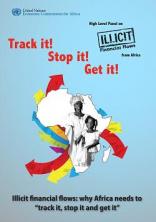Illicit financial flows - why Africa needs to “track it, stop it and get it”

Financing development in Africa has proved to be difficult in the past, compelling the continent to rely on external sources including overseas development assistance. This type of assistance is often unevenly distributed, unsustainable and, in some cases, damaging to national economies in the long run. Lessons learned from Africa’s development trajectory over the past three decades have prompted a fresh wave of thinking towards a post-2015 development agenda and Agenda 2063 transformative developmental framework designed to ensure self-reliance for Africa. In the light of the recent global economic and financial crises and the approaching deadline for achieving the Millennium Development Goals, a structural transformation agenda will require an adequate, predictable, sustainable and integrated financing mechanism geared towards financing development goals (Abugre and Ndomo, 2014). The continent must embark on reforms to capture currently unexplored or poorly managed resources. This includes curtailing illicit financial flows and transforming those funds into a powerful tool for enhancing domestic resource mobilization, as a way of furthering the continent’s development.